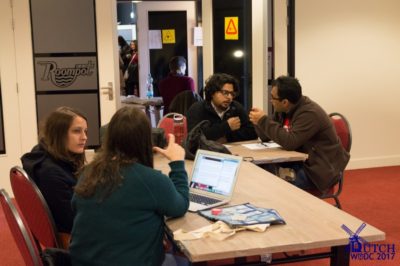This year’s Masters: Dutch Parliamentary

Masters this year: 2 vs 2, five minute speeches – © Manuel Adams
Traditionally, and before the WUDC pre-rounds begin on December 29th, there area few events worth noticing. These include pre-council meetings, the Women’s Forum, and other opportunities for exchange. Amongst them is another event worth noticing: the Masters competition. All interested WUDC judges are allowed to sign up in teams for two rounds to show their speaking skills before they judge those of others. This small competition is adjudicated by volunteer WUDC speakers and judges. As is tradition, the competition can be held in the host country’s national debating format, and so this year the Masters Debate is conducted in the Dutch Parliamentary format, in the Netherlands also known under the misleading name “Amerikaans-Parlementair“, as it is not used in any American country. (You can find the rules attached to this article at the end.)
Apart from potentially being conducted in a foreign national format, the WUDC’s Masters competition is also well-known for having rather entertaining motions, and speakers are given speaker points partly on grounds of being humorous. This year, Amelia Mc Leod, Sella Nevo, and Daan Welling served as Masters competition chief adjudicators. The competing teams were split into two groups and each group competed in two rounds with the following motions:
R1 (group 1): THW allow citizens to vote in elections or reality TV shows but not both.
R1 (group 2): THW choose the power of invisibility over the power of flight.
R2 (group 3): THS the Human Voluntarily Extinction Movement.
Fact sheet: The Human Voluntarily Extinction Movement (HVSM) calls for the voluntary extinction of the human species to eliminate the risk that human existence poses to the environment.
R2 (group 4): TH, as an American citizen, would migrate to Canada.

Lack of debating rooms led to cozy preparation time. – © Manuel Adams
After four rounds of fun, the results, kept secret by the round’s judges, now remain unknown until they are announced in about two days when the outrounds begin. We will report.
For those interested – the rules:
Dutch Parliamentary (Amerikaans-Parlementair)
There are 2 teams of 2 speakers each, delivering 3 speeches. The 1st speaker delivers both the 1st and 3rd speech of the team. Speaking times are 5-5-3 (and 7-7-5 for outrounds).
The order and rules of each position are as follows:
Prime Minister (5 minutes)
- Sets up the debate by defining the motion and giving a model; ∞ Sets up the teamline of the proposition;
- Advances arguments for their side.
Leader of Opposition (5 minutes)
- Sets up the teamline of the opposition, and – if necessary – gives a countermodel;
- Rebuts the arguments of the Prime Minister;
- Advances arguments for their side.
Member of Government (5 minutes)
- Rebuts the arguments of the Leader of Opposition;
- Rebuilds the arguments of the Prime Minister;
- Advances new arguments that fit with the teamline of the proposition.
Member of Opposition (5 minutes)
- Rebuts the arguments of the Proposition team;
- Rebuilds the arguments of the Leader of Opposition;
- Advances new arguments that fit with the teamline of the opposition.
As this speech has no constructive speech following it, and summary speeches are limited in time, the MoO speech is very powerful. In order to balance the format the Member of Opposition has the following constraints to any new arguments they bring:
- The new argument must have started before the second protected time has started, as to enable a POI from the proposition side;
- The new argument must fit in with the pre-existing teamline of the opposition (back-loading is not allowed).
Opposition Whip
- Summarises the debate and explains why the opposition has won;
- Is not allowed to introduce new rebuttal, but can focus on new trade offs.
Proposition Whip
- Summarises the debate and explains why the proposition has won;
- Is not allowed to introduce new rebuttal, but can focus on new trade offs;
- In particular, can rebut the MoO by trading them off with material brought earlier by their side.
Further rules
All rules pertaining to squirreling, kniving, etc. are exactly the same as the BP-rules.
POIs can be offered during the constructive 5-minute speeches. There are protected times during the first and last minute of the speech. POIs cannot be offered during the summary speeches.
lok.





